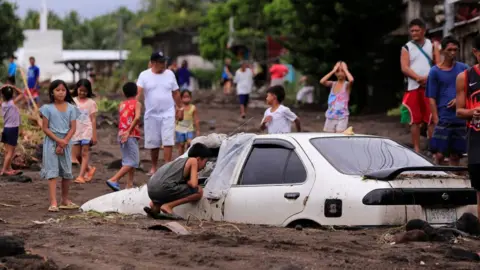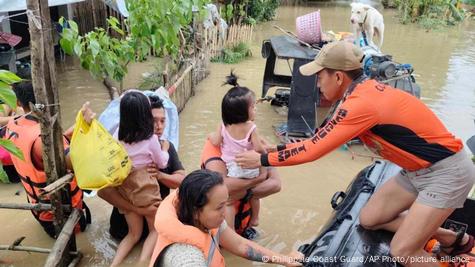Tropical Storm Trami has left more than 20 people dead and forced 150,000 to evacuate after dumping a month’s worth of rain in 24 hours across northern Philippines, with the Bicol peninsula bearing the brunt of the unusually intense deluge.

The storm, known locally as Kristine, made landfall Thursday on Luzon’s northeast coast, bringing winds up to 95 km/h (59 mph) and triggering widespread flooding that trapped residents in their homes. In Bicol, desperate citizens took to social media posting photos from their rooftops to appeal for rescue, prompting coast guard deployment of rubber boats.
“It’s getting dangerous. We’re waiting for rescuers,” resident Karen Tabagan told AFP from the flooded municipality of Bato, where floodwaters forced people and pets to retreat to second floors.
The unprecedented rainfall also triggered volcanic mudslides near Mount Mayon, an active volcano in Bicol, with photos showing vehicles and homes partially submerged in dark grey lahar. “The rains were really severe. We did not expect this,” said Glenda Bonga, Albay province’s acting governor, in an interview with ANC.

State weather bureau forecaster Ana Claren confirmed the rainfall exceeded 30-year averages, describing the precipitation as abnormal even for a region accustomed to tropical storms. Search efforts continue for a missing fisherman after a boat sank off Bulacan province, though rescue operations face challenges from strong wind-driven currents, according to local disaster official Geraldine Martinez.
As the storm moves toward the country’s northwest coast, officials maintain warnings about continued heavy rainfall, flooding, landslides, and storm surges. The weather bureau has identified another low-pressure system off Bicol that could develop into a tropical depression by week’s end.
The disaster highlights the Philippines’ increasing vulnerability to extreme weather events, with the country typically experiencing four typhoons annually. Recent years have seen storms characterized by stronger winds and heavier rainfall, raising concerns about climate change impacts on the archipelago.
The immediate crisis has forced the cancellation of at least a dozen flights across the country as rescue and evacuation efforts continue.



